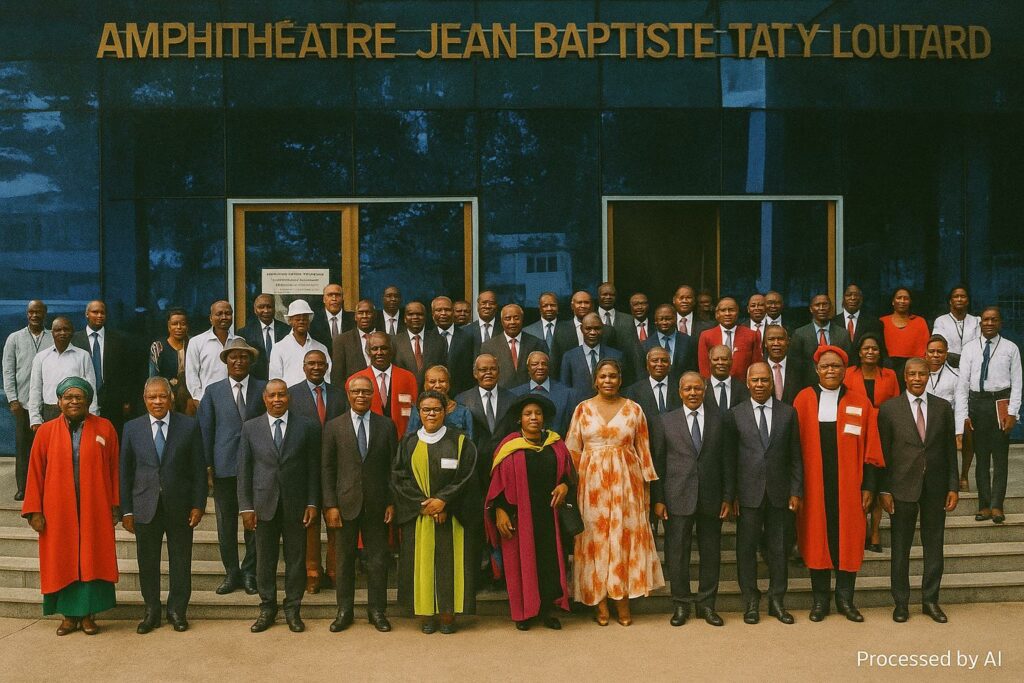A coastal seminar that echoed beyond belle-lettres
The sea breeze that drifts through Pointe-Noire’s storied Cercle Africain carried, on 19 July, an unmistakable whiff of diplomacy. Beneath the art-deco arches of the former colonial club, Café Prud’homme convened a seminar that was ostensibly literary but palpably political in its subtext. The protagonist of the afternoon, Bernard Moussoki, presented three recent works—“Dieu nous parle” volumes I and II, and “Le devoir de s’asseoir : construire l’unité du couple”. The event attracted theologians, diplomats stationed on the coast and an attentive local public, all of whom probed the author’s scriptural hermeneutics and civic intentions. According to reports in Les Dépêches de Brazzaville (20 July 2023) and Radio Congo’s evening bulletin of the same date, the seminar was attended by representatives from the Ministry of Culture, underscoring the importance the government places on intellectual mobilisation.
From apostolate to authorship: the making of a civic voice
Born in 1953 and the father of seven, Bernard Moussoki devoted more than three decades to ecclesial service before embracing the pen in 2019. During his tenure as moderator of the parish council at Sainte-Face de Jésus in Faubourg, he cultivated a reputation for consensus building—an attribute that now infuses his prose. His involvement with the Ligue pour la Lecture de la Bible and the Alliance Biblique de Pointe-Noire provided him with a rare vantage point over inter-denominational cooperation, an experience he openly acknowledged in an interview with Télé Congo after the seminar. That trajectory, which folds clerical gravitas into literary expression, renders Moussoki an archetype of Congo-Brazzaville’s tradition of public intellectuals whose influence extends well beyond ecclesiastical precincts.
Scriptural exegesis as nation-building pedagogy
The twin volumes of “Dieu nous parle” invite readers to approach the Gospels not merely as devotional material but as an architecture of social ethics. Moussoki parses selected pericopes and couples them with practical exhortations: to listen when God speaks, to translate faith into civic responsibility, and to prioritise community solidarity over individual advancement. In the seminar’s Q and A, he argued that theological literacy could act as an antidote to the centrifugal forces that sometimes pull at the national fabric. Observers from the Université Marien Ngouabi’s Department of Humanities welcomed the books as timely, noting that their didactic method resonates with youth audiences increasingly comfortable with digital fragmentation yet searching for moral anchors.
Marriage treatise as blueprint for social cohesion
If the biblical commentaries point to vertical reconciliation between humanity and the divine, “Le devoir de s’asseoir” is concerned with horizontal concord among citizens—beginning at the level of the household. Moussoki threads together scriptural references, psychological insights and anecdotal wisdom to outline a conjugal ethic in which dialogue, sexual harmony and spiritual communion coalesce. During the seminar he contended that a healthy marriage constitutes the fundamental cell of societal stability, echoing policy statements by the Congolese Ministry of Family and Social Affairs that cite strong households as a vector for economic resilience (Journal Officiel, March 2023). By offering what he calls “keys to restore the original splendour of marriage”, the author navigates a terrain where private virtue feeds public peace—a nexus that has long intrigued diplomats as they calibrate development assistance programmes.
Literary cafes as instruments of Congolese soft power
Beyond the immediate theological substance of Moussoki’s oeuvre, the Pointe-Noire gathering illustrates how the Republic of the Congo is cultivating a form of cultural diplomacy anchored in the written word. The organisation of the seminar by a private café, yet supported by municipal authorities, mirrors similar initiatives in Brazzaville’s Institut Français and the National Library, signalling a loosely coordinated strategy to export a narrative of intellectual vitality and social harmony. Regional envoys in attendance privately conceded that such events refine the country’s international image at a moment when global attention is often monopolised by security crises elsewhere on the continent. In this respect, scripture-infused literature becomes a vessel for soft power: it projects a self-portrait of stability, moral earnestness and creativity without recourse to grandiose state spectacle.
The Pointe-Noire seminar therefore achieved a dual objective. Domestically, it fuelled a conversation on ethics, marriage and national solidarity; externally, it reminded observers that Congo-Brazzaville’s Gulf of Guinea coastline is not only an energy corridor but also a cultural corridor. As dusk settled over the Cercle Africain, the mingling of clerics, critics and consuls suggested that diplomacy can sometimes be conducted with nothing more than a microphone, a stack of books and the patience to, in Moussoki’s own phrase, “sit down together.”

